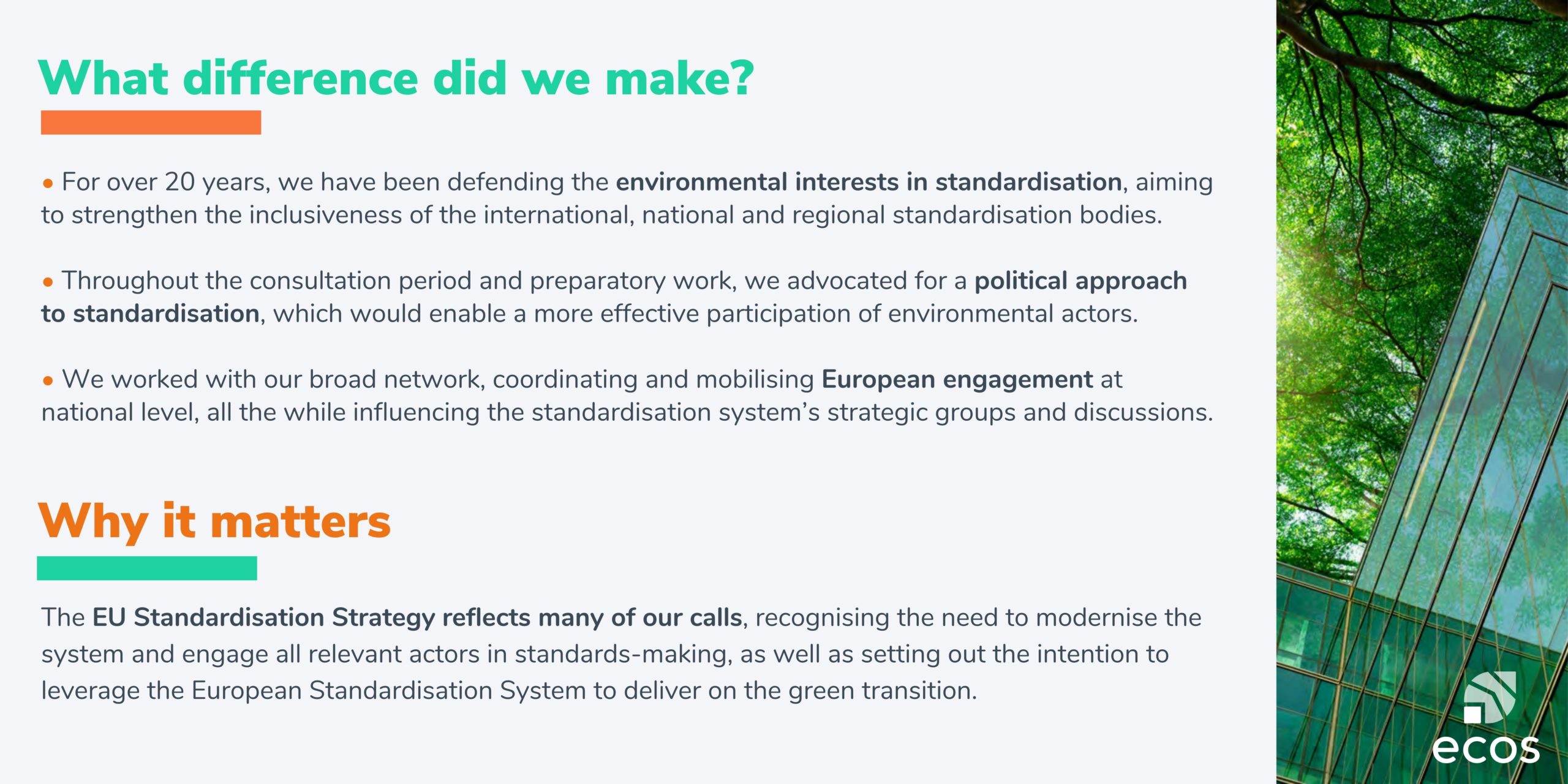EU Standardisation Strategy – our chance to ensure that standards truly work for the environment
In February 2022, the EU published its new Standardisation Strategy. It is a unique opportunity to make standards work for the environment and strive for civil society voices to be properly represented in standard-setting at all levels – a priority for ECOS, and something we have long advocated for.

Giving the planet a proper voice
Inclusiveness – a notion which is becoming more and more popular in many areas. We strive for inclusive workplaces, events, schools… But few people know that inclusiveness is also a buzzword in the standardisation system.
“More than ever, standards do not only have to deal with technical components, but also incorporate core EU democratic values and interests, as well as green and social principles”, we read in the EU Standardisation Strategy. ECOS has long been requesting the reinforcement and streamlining of inclusiveness in standardisation. Only this way can we ensure the effective participation of underrepresented groups within the system – and a balanced representation of stakeholders equals a balanced representation of interests, including environmental issues.
Even though Europe had developed a unique system for standard-setting that allows access to underrepresented societal stakeholders, access alone does not guarantee that public interest will be considered. There was a great need for the Strategy to improve decision-making processes so that they resolve the problem of an uneven representation in standards-making within the European Standardisation Organisations. To top this off, when technical standards are developed at international or national level, civil society engagement is neither guaranteed nor sufficient – an issue Europe should also set out to tackle.
A golden opportunity
All these considerations were taken into account in the making of the EU Standardisation Strategy. It is a unique opportunity for the EU to make standards work for the environment and strive for civil society voices to be properly represented in standard-setting at all levels.
Throughout the consultation period and preparatory work, we followed the process very closely, providing the European Commission with our recommendations. We advocated for a political approach to standardisation, which would enable a more effective participation of environmental actors. In addition, we worked with our broad network, coordinating and mobilising European engagement at national level, all the while influencing the standardisation system’s strategic groups and discussions.
Systemic changes
The Strategy is surely a welcome step, and it clearly shows the appetite to establish Europe as a global standards-setter.
In particular, we were glad to see a number of our long-standing asks reflected in the document:
- Serving public interest
The Strategy acknowledges that standards are not only related to technical requirements, but have impact on core democratic values and interests, recognising the need to engage all relevant actors, including environmental stakeholders. The document also commits to making the European standardisation system more functional, to serve the EU public interest and promote sustainability.
- Supporting climate goals
The Strategy sets out the intention to leverage the European Standardisation System to deliver on the green transition. Standards have an important role to play in the inevitable move to climate neutrality and environmental sustainability.
In practice, the Commission commits to focus on standards needed to meet the European Green Deal objectives, and highlights that standards related to ecodesign should be promoted for global adoption to ensure a wide international pursuit of policy goals. We are proud to have contributed to steering the discussion in this direction.
- Modernising the system
The Strategy is a firm commitment to improving and modernising the governance and functioning of the European Standardisation System, at the same time providing a plethora of tools to assist the Commission in tackling the crucial issue of timing, which is key to ensuring that harmonised standards underpin EU regulation.
20+ years on the green line to standards
ECOS has been defending the environmental interests in standardisation since 2001. Our activities go beyond taking part in the drafting of standards: we aim to strengthen the inclusiveness of the international, national and regional standardisation bodies. Promoting effective participation of a wide range of stakeholders is at the very core of our mission, together with ensuring that environmental objectives become an integral part of standardisation work.
Many things have changed throughout the 20 years of our existence. To begin with, the EU has officially recognised that a combination of expertise from industry, public administrations, civil society, research and academia can deliver on all critical aspects of standards development. Environmentally ambitious standards are essential for Europe to achieve its geostrategic ambition and support the European Green Deal. These are all very positive signs – but there is much more to be done to complete the puzzle.
An eye on the horizon
The Commission must now maintain environmentally ambitious policy goals and the supremacy of mandatory legislation over voluntary standards in areas of public interest where the environment is crucial. The EU Standardisation Strategy should also push strongly for the effective participation of relevant civil society experts in standardisation processes globally.
Today, the EU is the region with ahighclimate ambition. As a global leader, Europe must not stop in its tracks. Instead, it should use its position to push the climate agenda in international standardisation, particularly where existing international standards do not match European environmental ambition (such as recyclability of electric car batteries). A stronger Europe in the standardisation world would be excellent news for global climate action.
The Strategy brought us some of the commitments we had been long calling for. Encouraging as it is, we will not lose focus – the implementation stage will be equally crucial for the Strategy to make a real difference.


